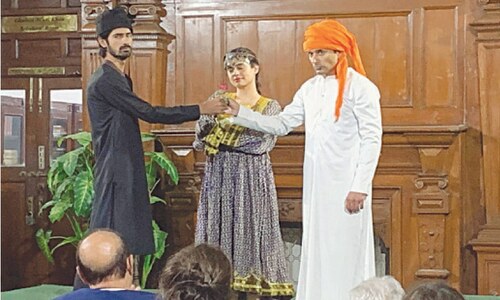Translating any piece of literature into any other language is no plain sailing and translating poetry is even more difficult, considering its intricate form as compared to fiction or prose. It becomes further harder if the language used is centuries old and the translator wants to keep the original form intact while also focusing the context and nuances of language.
However, Taufiq Rafat, one of the best English poets Pakistan has produced, has made it look easy when translating Qadiryar’s Puran Bhagat into English.
Rafat took liking for the Qissa, famous across the swathes of Punjab, of Qadiryar, a poet from Gujranwala, due to its setting, Sialkot, which is the city of Puran as well as Rafat’s himself.
In the introduction to translation, he says: “I felt particularly close to it since Sialkot is my hometown as it was Puran’s; I am familiar with Puran’s well, the scene of the his great ordeal; and family residence is in Puran Nagar, a part of the town named after that saint. As I walked the streets of Sialkot I could imagine Puran treading the same ground nearly two thousand years ago.”
Puran’s legend is famous just as his younger brother Raja Rasalu’s. Rasalu is born due to blessings and prayers of Puran after he attained sainthood. He is the son of the Salwan, Raja of Sialkot, from his first wife Ichhran. On pundits’ prediction and insistence, he was kept away in seclusion for 12 years. When he comes back after this period, Salwan has got another wife, Lunan, who is too young for him. She is bedazzled by the charm of Puran and tries to seduce him. On his refusal, she accuses him of attempting to rape her. At this Raja Salwan orders cutting of Puran’s hands and throws him in a well to die there. He remains there for years and at last is saved by Guru Gorakhnath and becomes his disciple, attaining the status of sainthood himself. Meanwhile, Raja’s state is afflicted with famine and hunger and Puran’s mother Icchran loses her sight. When Puran returns to his native land his own father and stepmother, who fail to recognise the transformed Puran, go to him, not knowing that it was their son from whom they were going to seek blessings for a child. There Lunan accepts her fault and seeks forgiveness from Puran and prays for a child. Puran brings back the sight of his mother Icchran too.
Rafat says some details of the legend might have been exaggerated as it traveled from heart to heart through the two millennia.
Qadiryar has written Puran Bhagat in the form of a si harfi whose every stanza contains four couplets, each with second, fourth, sixth and eighth lines having similar rhyme and every line starting with an alphabet. The greatest achievement of Rafat in translating Qadiryar is that he keeps the rhyme scheme intact, though he translates, concentrating on the whole stanza translating it line by line. Rafat has dispensed with the use of first alphabet because ‘the tradition is non-existent in English’. Qadiyar used his name in the last line of every stanza while during translation Rafat has omitted that as well, except a couple of places ‘where it does not interfere with the poem’s narrative flow’.
In the translator’s note, Rafat mentions some of the difficulties he faced while rendering Puran Bhagat into English and the changes he made in the text. Like in the original poem, Puran’s hands are restored by Guru Gorakhnath but in Rafat’s translation, his hands are not restored. Citing the reason, he says, “I feel the pathos power of the poem is enhanced by my interpretation”. In his note, he also gives credit to Najam Hussain Syed and Maqsood Saqib whom he consulted for the translation.
Along Rafat, Athar Tahir also deserves credit for writing an extensive and detailed 49-page introduction to the poem.
English poet Athar Tahir, who himself was mentored by Rafat, gives a background to the Puran’s tale which has been a part of the rural Punjab’s subconscious for the last two millennia, saying: “Popular legends attribute the re-founding of Sialkot, at the time of Vikramaditiya, to Puran’s father in the first century BC. One critic places the legend around the 4th and 5th century AD when India disintegrated and feudal states emerged as political organisations.”
Tahir writes about the possible Greek influences on the legend of Puran, pointing out the legend of Phaedra and Hippolytus, given the form of a play by Euripedes. He says that influences might have been due to about three-century long stay of the Greeks in Punjab with the arrival of Alexander in May 327BC.
Athar Tahir introduces Qadiryar who was born as Qadir Bakhsh at Machhikey village near Eminabad, Gujranwala, in 1802 during the rule of Maharaja Ranjit Singh. He was a farmer but well-versed in literature. Athar writes elaborately on all the works of Qadiryar and genres he ventured into, giving the history of the genres as well. He gives details of Qadiryar’s Miraj Nama, Hari Singh Nalwa di Var (Hari Singh Nalwa, the famous general of Ranjit Singh, both belonging to Gujranwala), Rozah Nama and Sohni Mahinwal.
At the end of the poem, a glossary of Punjabi words with English meanings is also given to make it easier for the readers to understand the poem. The best quality of the translation is that it juxtaposed the original Punjabi text with the English version. It was published in 1983 and there is a dire need to reprint it to keep the Punjabi heritage alive and introduce the younger generations to great works and poets from the land.
Published in Dawn, August 17th, 2014















































Dear visitor, the comments section is undergoing an overhaul and will return soon.